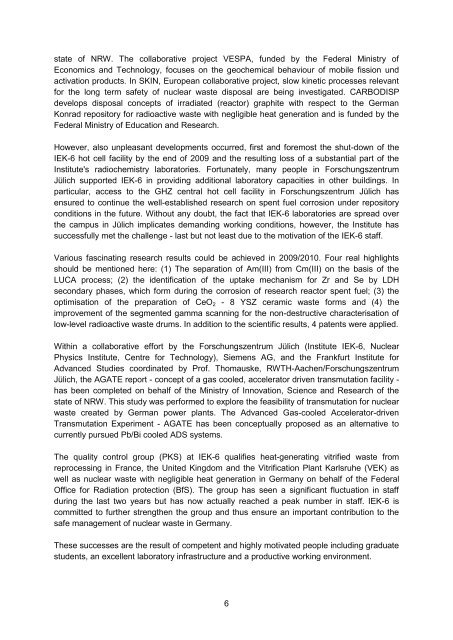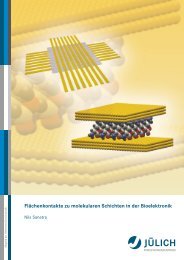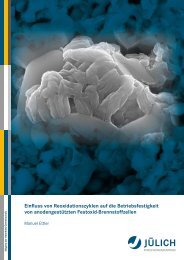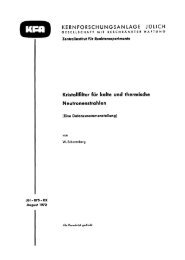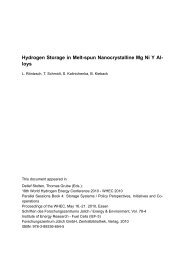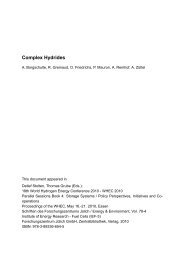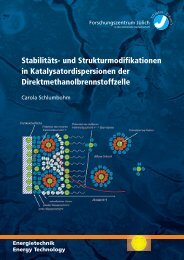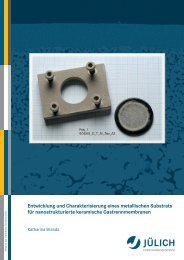Annual Report 2009/2010 - JUWEL - Forschungszentrum Jülich
Annual Report 2009/2010 - JUWEL - Forschungszentrum Jülich
Annual Report 2009/2010 - JUWEL - Forschungszentrum Jülich
You also want an ePaper? Increase the reach of your titles
YUMPU automatically turns print PDFs into web optimized ePapers that Google loves.
state of NRW. The collaborative project VESPA, funded by the Federal Ministry of<br />
Economics and Technology, focuses on the geochemical behaviour of mobile fission und<br />
activation products. In SKIN, European collaborative project, slow kinetic processes relevant<br />
for the long term safety of nuclear waste disposal are being investigated. CARBODISP<br />
develops disposal concepts of irradiated (reactor) graphite with respect to the German<br />
Konrad repository for radioactive waste with negligible heat generation and is funded by the<br />
Federal Ministry of Education and Research.<br />
However, also unpleasant developments occurred, first and foremost the shut-down of the<br />
IEK-6 hot cell facility by the end of <strong>2009</strong> and the resulting loss of a substantial part of the<br />
Institute's radiochemistry laboratories. Fortunately, many people in <strong>Forschungszentrum</strong><br />
<strong>Jülich</strong> supported IEK-6 in providing additional laboratory capacities in other buildings. In<br />
particular, access to the GHZ central hot cell facility in <strong>Forschungszentrum</strong> <strong>Jülich</strong> has<br />
ensured to continue the well-established research on spent fuel corrosion under repository<br />
conditions in the future. Without any doubt, the fact that IEK-6 laboratories are spread over<br />
the campus in <strong>Jülich</strong> implicates demanding working conditions, however, the Institute has<br />
successfully met the challenge - last but not least due to the motivation of the IEK-6 staff.<br />
Various fascinating research results could be achieved in <strong>2009</strong>/<strong>2010</strong>. Four real highlights<br />
should be mentioned here: (1) The separation of Am(III) from Cm(III) on the basis of the<br />
LUCA process; (2) the identification of the uptake mechanism for Zr and Se by LDH<br />
secondary phases, which form during the corrosion of research reactor spent fuel; (3) the<br />
optimisation of the preparation of CeO 2 - 8 YSZ ceramic waste forms and (4) the<br />
improvement of the segmented gamma scanning for the non-destructive characterisation of<br />
low-level radioactive waste drums. In addition to the scientific results, 4 patents were applied.<br />
Within a collaborative effort by the <strong>Forschungszentrum</strong> <strong>Jülich</strong> (Institute IEK-6, Nuclear<br />
Physics Institute, Centre for Technology), Siemens AG, and the Frankfurt Institute for<br />
Advanced Studies coordinated by Prof. Thomauske, RWTH-Aachen/<strong>Forschungszentrum</strong><br />
<strong>Jülich</strong>, the AGATE report - concept of a gas cooled, accelerator driven transmutation facility -<br />
has been completed on behalf of the Ministry of Innovation, Science and Research of the<br />
state of NRW. This study was performed to explore the feasibility of transmutation for nuclear<br />
waste created by German power plants. The Advanced Gas-cooled Accelerator-driven<br />
Transmutation Experiment - AGATE has been conceptually proposed as an alternative to<br />
currently pursued Pb/Bi cooled ADS systems.<br />
The quality control group (PKS) at IEK-6 qualifies heat-generating vitrified waste from<br />
reprocessing in France, the United Kingdom and the Vitrification Plant Karlsruhe (VEK) as<br />
well as nuclear waste with negligible heat generation in Germany on behalf of the Federal<br />
Office for Radiation protection (BfS). The group has seen a significant fluctuation in staff<br />
during the last two years but has now actually reached a peak number in staff. IEK-6 is<br />
committed to further strengthen the group and thus ensure an important contribution to the<br />
safe management of nuclear waste in Germany.<br />
These successes are the result of competent and highly motivated people including graduate<br />
students, an excellent laboratory infrastructure and a productive working environment.<br />
6


